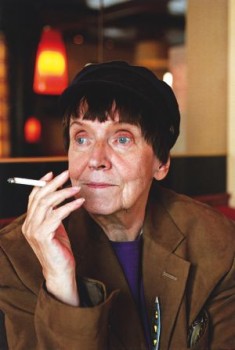Search results for "herbert lomas/www.booksfromfinland.fi/2004/09/no-need-to-go-anywhere"
In my memory
31 December 1987 | Archives online, Fiction, poetry
Poems and aphorisms from four collections. Introduction by Erkka Lehtola
Let the healing epidemics out! There must be some.
The many-headed monster, the market ideology, it can simultaneously read, count and even write at least 666 works. And without the sign of the beast no one can buy or sell.
Those who can read know you only realise you’ve forgotten how
when you can do it again.
What a handsome winter we have here! If it weren’t so dark, we’d see it. We could orientate ourselves on the stars with the beam from a pocket torch. Somewhere in mid-sky, I’d say, they come flying along on long lights.
As a child I said I’ll do what I want. Now I want what I do.
Who’s in the middle when the two sides of your face are side by side, as they are, in the mirror.
The trees that hide the sun are bright inside.
A frosty night when you feel the stars on your skin and discuss what you’re wearing.
Somebody’s walking over there, with an umbrella over his head, taking the rain for a walk.
I’m so delighted to find so much that’s useless.
What a relief there’s no longer enough time to get acquainted.
From Tuoreessa muistissa kevät (‘Springtime fresh in the memory’), 1987 More…
New from the archive
29 June 2015 | This 'n' that

Mirkka Rekola. Photo: Elina Laukkarinen/WSOY
Enigmatic stories, poems and aphorisms by Mirkka Rekola
This week, poems and aphoristic short stories by Mirkka Rekola (1931-2015).
Rekola, as the long-time Books from Finland translator Herbert Lomas put it, was ‘a minimalist before minimalism was invented’. Amazingly enough, her sparklingly terse writing was considered ‘difficult’, and she had to wait until the 1990s before her work was widely read.
Rekola produced her first collection, Vedessä palaa (‘Burning water’) in 1954, making the cardinal mistake of choosing as publisher the conservative WSOY rather than the avant-garde Otava. The book received mixed reviews; as she said, ‘for readers of traditional verse I was completely unfamiliar, while for ultra-modernists I was not modern enough.’
All the work we revisit here shows the extraordinary vividness, accuracy and exuberance of her writing – both in the poems and the often ruefully funny short stories called ‘Mickeys’.
![]()
The Books from Finland digitisation project continues, with a total of 402 articles and book excerpts made available on our website so far. Each week, we bring a newly digitised text to your attention.
Ordinary people
30 June 1990 | Archives online, Fiction, poetry
Poems from Vaikka aamuun on vielä aikaa (‘Though it’s still a long time till morning’, 1989) Introduction by Risto Rasa
This time
this time of consensus
that teaches
the poor to love the prosperous,
the bossed to love the bossers
the kicked to love the kickers
and all of us to love humility
obedience and biddability
before the hingdom, the power and the glory:
this time
cries out for a tearer-up,
calls for a muster
of thousands and thousands
of serious and honest busters. More...
Time walks slowly
30 June 2002 | Fiction, poetry
When Eira Stenberg (born 1943) began writing in the heat of of Africa, her pen sank into the paper like a tattooing needle into the skin, she says. Her experiences there are alive in her book of poems entitled Siksi seurustelen varkaiden kanssa (‘That’s why I consort with thieves’, Tammi, 2002)
The journey
Wheels clattering, landscape speeding by the window to the past
notebook on lap she understood the journey’s essence,
that it’s a lap she lost in early childhood
when she stood up and set off walking
away from the arms that had carried her from room to room
giving views from on high as if from a mountain:
the apparitions of things, the furnishings, the tints of pictures
and the bedroom mirror they arrived in,
mother and a child, a holy image she met
again in churches and on altars everywhere
as if it were the purpose of the journey: More…
Words of feeling
31 March 2002 | Fiction, poetry
Poems from Vain tahallaan voi rakastaa (‘You can only love deliberately’, WSOY, 2001)
The musicians of Bremen (Self-portrait as a five animals)
People say man’s above all the other beasts.
I decided to prove that – and first turned poet
and then painfully became a flying horse, celebrating its freedom
on great shivering brawn. They captured me and put me to pulling
loads, and, seeing I endured everything docilely, they said,
He’s like the Giant Atlas, or Hanuman, the upholder of the world.
And they whipped me and sat on my back and finally
buried me alive. I became a pig and gorged my bellyful and my senses full
and it horrified people, who said: He’s a disease, an epidemic, Death itself.
And they cut my ears and blinded me and sliced my belly in two.
And I turned into a dog and learned everything I was taught and they said,
He’s completely without a will, like the angels, like an ascetic, and a prophet.
And they drove me out to wander the streets and the wildernesses. And in the desert
I turned into a tiger and people shouted in terror
What on earth
has God done – look, he’s Satan himself. And they shot me
from an elephant’s back. And I died into a cock and people woke up and shouted,
The healer of the world! And whenever I sing, because I only sing untold-to,
People wring my neck. More…
Poems
31 March 1980 | Archives online, Fiction, poetry
Poems from Kallista on ja halvalla menee (‘It comes dear and it’s going cheap’,1975) and Reviirilaulu (‘Territorial song’, 1978). Introduction by Pentti Saaritsa
1
A seagull shadow flitters across the gulf of the courtyard
over the gone-sour yellow wall
ogreish and swift as an execution by hanging,
that’s how I’m dangling
from this moment in this city
my ankle in the strangling noose
in the night under the jangling stars while over the roofs
a sheetmetal moon’s rising
and blurred dreams are yawning in a thousand windows,
down below me the city
and in my breast my heart, it’s socking
like a knuckleduster.
2
The simplest noise,
the noise of a glass
when you put the glass down
on a wooden table, the sound of wood
on glass
is like
a flash of happiness
on a melancholy face.
Moving on
30 June 2003 | Archives online, Fiction, Prose
Extracts from the short story ‘Tunnin kuvat’ (‘One-hour processing’, from the collection Vapiseva sydän, ‘Tremulous heart’, Tammi, 2002). Introduction by Harry Forsblom
Last summer, when I was helping my brother with his move, he said I could take as many of his old LPs as I wanted. There were actually two of us on the job: his younger friend Timbe was along, and when we’d almost completely cleared out the flat and my brother’s two cellar closets (he’d rented an extra closet from the next-door flat, as he was submerging under the clobber lying around everywhere), he said the same to Timbe: ‘Just help yourself.’ The records we ourselves didn’t want would be chucked in the rubbish.
More Tumpkin tales
30 June 1992 | Archives online, Children's books, Fiction, poetry
Poems from Tiitiäisen pippurimylly (‘The Tumpkin’s pepper mill’, Otava, 1991). Kirsi Kunnas’s classic children’s books, Tiitiäisen satupuu (‘The Tumpkin’s story tree’) and Tiitiäisen tarinoita (‘The Tumpkin’s tales’), appeared in 1956 and 1957
Mr Saxophone and Miss Clarinet
Mr Saxophone went moony beginning to fret about Miss Clarinet: Moan moan moan darling little crow! I love you so! moaned Mr Saxophone.
Miss Clarinet was very upset: I won't be owned! And I'm no little crow! I sob like a dove, and even about love I sing alone! Oh moan moan moan groaned Mr Saxophone.
Afterthought
30 June 1999 | Archives online, Essays, Non-fiction
From Novellit (‘The Short stories’, Otava 1985). Interview by Maija Alftan
The short story is a matter of expectancy and reception. So it has to offer surprises. It has to reward the waiting.
The surprises are caused by the known and the familiar. Often some mishap is needed; the most crucial can be some social fix. The story’s limited space provides three states, brought about by a change in the environment: the past, the future and the passing moment. They create a special, unique phase of life for one of the characters. A return to the past leads to the new – not to the previous, situation – and this isn’t in anyone’s control. Short stories often contain arbitrariness. More…
The sea so open
30 September 2008 | Archives online, Fiction, poetry
Poems from Delta (Teos, 2008). Introduction by Jukka Koskelainen
Like wave-polished stones
we sit on a seashore rock, shading our eyes
from the sun, each other, the deltoid sails, the water.
You ask nothing more,
you know the sum of the angles of a triangle,
that you have your sides, as I do
sometimes they near each other
as if to penetrate each other, cut
a hole in the landscape.
A seagull settles on a crag,
without a glance aside, you’re up and disappear
from my side.
Sails, other sails.
the sea so open and the sky open. More…
Images of isolation
31 March 1992 | Archives online, Fiction, poetry
Poems by Helvi Juvonen, commentary by Soila Lehtonen
Little is known of the circumstances of Helvi Juvonen’s life. Her fame rests on five collections of poetry – mixing humility and celebration with an uncompromising rigour – published in the ten years before her death at the age of 40 (a sixth appeared posthumously). Her existence, in the drab surroundings of post-war Helsinki, was modest: after studies at Helsinki University, and posts as a bank clerk and proof-reader, she lived by writing and translation, including some brilliant renderings into Finnish of the poems of the 19th-century American poet Emily Dickinson.
Helvi Juvonen’s universe is crowded with ostensibly insignificant phenomena: her eye discerns a mole, lichen, dwarf-trees, a shrew; she studies tones of stone and moss; she ‘doesn’t often dare to look at the clouds’.
Us
Rocks, forgotten within themselves,
have grown dear to me.
The trees’ singing, so useless,
is my friend.
Silver lichen,
brother in beggary,
please don’t hate my shadow
on the streaked rock. More…
Geneswing
30 June 2001 | Fiction, poetry
Poems from Tuulen vilja (‘Windcrop’, WSOY, 2000)
Longbeaked birds
created for the deepfunnelled gloxinia – everything exactly right.
The sport of colours, survival (though I always felt I was
sunset in the morning).
I walk over the living, the playful swing of genes,
uniqueness in splinters: capsules,
family trees, root systems, leafage.
In the geneswing little deviations of dimension,
as if I were perpetually outlining waves with my finger.
The primal miracle of seeds: I press
a mixture of summer flowers in the soil, exploding
a serial miracle. More…


